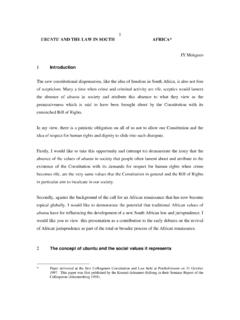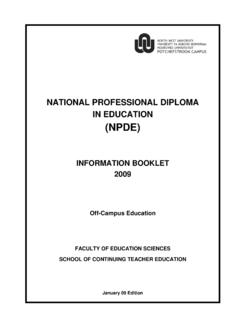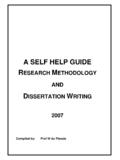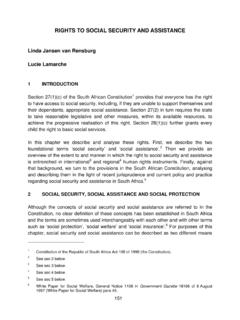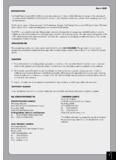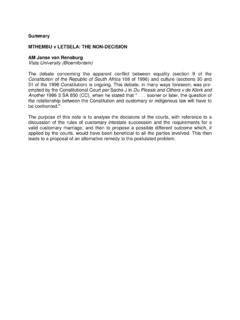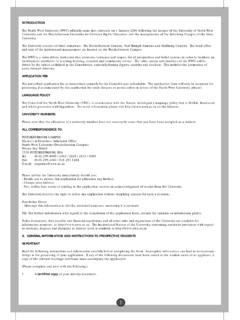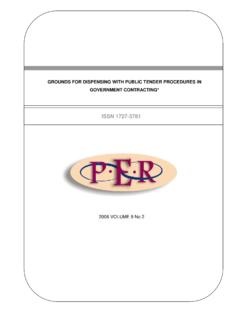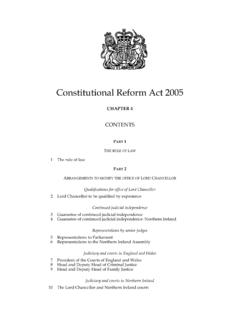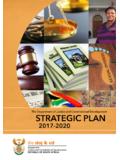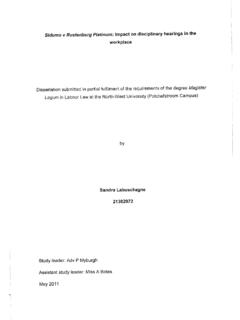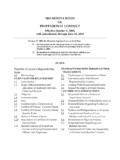Transcription of CULTURE (AND RELIGION) IN CONSTITUTIONAL …
1 1 CULTURE ( and religion ) IN CONSTITUTIONAL adjudication * Prof Christa Rautenbach** Dr Fanie Jansen van Rensburg** Prof Gerrit Pienaar** 1. Introduction The 1996 Constitution1 and its predecessor2 were responsible for revolutionary changes in the CONSTITUTIONAL history of South Africa. Probably one of the most important changes is the replacement of parliamentary sovereignty with CONSTITUTIONAL Coupled with that was the enactment of an entrenched Bill of Rights4 and the establishment of a CONSTITUTIONAL court with final jurisdiction over CONSTITUTIONAL The judiciary and, especially the members of the CONSTITUTIONAL court, play a very important role within this dispensation. The task of the judiciary has been described as follows:6 It will be the task of the judiciary and especially the members of the CONSTITUTIONAL court to vindicate the fundamental rights of those litigants who come before them.
2 It will be their task to interpret the provisions, give them meaning and * Revised paper delivered at the 5th Colloquium on Constitution and Law, Johannesburg 16 November 2002. The paper forms part of a project of the faculty of law, Potchefstroom University for CHE in corroboration with the Konrad-Adenauer-Stiftung on Politics, Socio-Economic Issues and CULTURE in CONSTITUTIONAL adjudication . We would like to thank Prof JD van der Vyver for comments that he made on an earlier draft of this article. ** B Iuris LLB LLM LLD. Associate Professor, faculty of law, Potchefstroom University for CHE. ** Senior Researcher (Social Anthropology), Focus Area for Sustainable Social Development, Potchefstroom University.
3 ** B Iur et Comm LLB LLD. Professor, faculty of law, Potchefstroom University for CHE. 1 Constitution of the Republic of South Africa 108 of 1996 (hereinafter referred to as the 1996 Constitution). 2 The Constitution of the Republic of South Africa 200 of 1993 (hereinafter referred to as the 1993 Constitution). 3 Section 4 of the 1993 Constitution and section 2 of the 1996 Constitution. 4 Contained in chapter 3 of the 1993 Constitution and chapter 2 of the 1996 Constitution. 5 Section 98(1) of the 1993 Constitution and sections 166 and 167 of the 1996 Constitution. 6 Heath and Blomkamp (eds) Foreword in 1994 1 BCLR vi. 2context, and to set the bounds of constitutionally permissible limitations on them. This will require adapting to and developing new ways of thinking. Judicial officers and legal practitioners will, in a sense, have to make a new start.
4 In this journey, some will of necessity be in the advance guard, setting up the guideposts for those to In order to contribute to the setting up of guideposts for South African courts the faculty of law of the Potchefstroom University for Christian Higher Education in corroboration with the Konrad-Adenauer-Stifttung embarked on a study on Politics, Socio-Economic Issues and CULTURE in CONSTITUTIONAL adjudication . The aim of the project is twofold. The first aim is to analyse the influence of political, socio-economic and cultural considerations on the CONSTITUTIONAL court s interpretation and application of the Bill of Rights. The second aim is to develop practical guidelines (based on the findings during the analysing process) for South African courts confronted with issues of a political, socio-economic and cultural nature.
5 This article is concerned with initiating discussions of the decisions of the CONSTITUTIONAL court with regard to cultural and religious rights. However, before we can explore the role of political, socio-economic and cultural (and religious) rights in the decisions of the CONSTITUTIONAL court it is important to discuss a few preliminary issues. Firstly, the meaning of CULTURE and religion within the South African context warrants some explanation. Secondly, some comments regarding CONSTITUTIONAL protection of culturally and religiously based rights will be made. This may well be a daunting task, not only in view of the seemingly abysmal gap between the applicable CONSTITUTIONAL values enshrined in the 1996 Constitution and cultural and religious values that, in some instances over 7 Own emphasis.
6 The purpose of the project on Politics, Socio-Economic Issues and CULTURE in CONSTITUTIONAL adjudication will be to develop practical guidelines for South African courts 3centuries, brought about customs and practices within traditional communities which seemingly, infringe on some of these CONSTITUTIONAL values and rights. 2. Meaning of CULTURE and religion and the 1996 Constitution Various sections in the 1996 Constitution make use of terms such as CULTURE , tradition and religion to refer to the cultural diversity of South However, the 1996 Constitution does not define these terms and it is necessary to determine what CULTURE , tradition and religion in the 1996 Constitution entails for purposes of this study. The 1996 Constitution uses the term CULTURE in three distinct ways.
7 Firstly, CULTURE is used as a specific tradition based on ethics. In this sense it is used to describe the development or improvement of a situation. For example, it is one of the functions of the South African Human Rights Commission to promote a CULTURE of human rights. 9 The CONSTITUTIONAL court has also used the term CULTURE in a similar context, for example: Islamic Unity Convention v Independent Broadcasting Authority:10 [A] society based on a constitutionally protected CULTURE of openness and democracy and universal human rights for South Africans. Khumalo v Holomisa:11 [T]he development of a democratic CULTURE . S v Walters:12 [P]romoting a CULTURE of respect for human life and dignity. S v Williams:13 Courts have a role to play in the promotion and development of a new CULTURE founded on the recognition of human nights.
8 Confronted with political, socio-economic and cultural issues. 8 Sections 9, 30, 31, 181, 184-186, 235 as well as schedules 4 and 5 refer to CULTURE , cultural life, cultural community and cultural heritage. Sections 9, 15-16, 31 and 37 refer to religion , conscience, thought, belief and opinion and sections 15, 143, 211-212, 219 as well as schedules 4 and 5 refer to tradition or traditional leaders. 9 Own emphasis. See sections 184 and 234 of the 1996 Constitution. 10 2002 4 SA 294 (CC) par [27]. Own emphasis. 11 2002 5 SA 401 (CC) par [24]. Own emphasis. 12 2002 4 SA 613 (CC) [6]. Own emphasis. 4 The values of human rights, as explicated in the Constitution (democracy, openness, respect for human life and dignity) are contrasted to values in other systems, implying a preference for the former and the need to change the latter to conform to the ideals of the Constitution.
9 From a viewpoint of cultural relativism this apparent evaluation of some elements of a cultural system by using another cultural system as context is very problematic and should be (re-)considered with some scepticism. Oversimplification of this problem can have dire effects on a global approach to human rights. In practical terms, we also know that the promotion of the values of human rights, which has become a strong universal trend, also has its own cultural (albeit diverse), and mostly Western Although it should be possible to have universal agreement on fundamental human rights, the real possibility of Western domination should also here be borne in mind. Secondly, the term CULTURE is used as a collective term for aesthetical In this sense, CULTURE means, inter alia, literature, theatre, music and sculpture.
10 The CULTURE Promotion Act16 serves as an example of legislation dealing with CULTURE in such a sense. The use of CULTURE to signify performing and plastic arts is not consistent with the first and broader use of the term and is also a very limited way of seeing CULTURE which actually is mostly viewed by social scientists as the product of all human Thirdly, the term CULTURE is used as a modality that identifies and binds a specific group of CULTURE is then understood as a determining source of identity it draws distinctions between people on grounds of a 13 1995 3 SA 632 (CC) par [8]. 14 Gaete The West, its Other and human rights in Skelton & Allen (eds) CULTURE and Global Change (Routledge London & New York 1999) 193-200.

